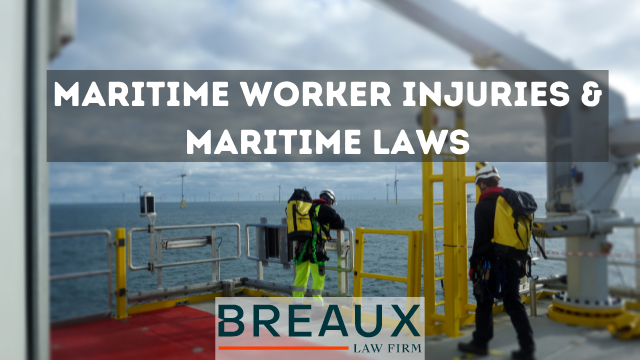
There are approximately 360 commercial ports that serve the United States, according to the U.S Coast Guard. The Gulf Coast provides employment to many people, who work on the docks or offshore. In the USA there is a wide range of career opportunities in the marine sector and shipping industry. Many people are interested and love to work in the marine industry. Because seafaring careers are more advantageous and high-paying than land-based jobs.
Marine career offers lots of benefits but it also introduces a higher risk of accidents and injuries than any other sector. According to the study of the Centers for Disease Control and Prevention (CDC), in the USA maritime employees have a higher fatality, injury, and illness rate than other land-based jobholders.
When a maritime worker is injured, they aren’t qualified for traditional workers’ compensation coverage, their claim will be run under federal maritime law.
Here is a guide to help you understand the maritime workers’ rights, legal options, and when to hire a maritime personal injury lawyer after an on-the-job injury.
Let’s explore the article….
What Is a Maritime Injury?
Maritime employment-related injuries are known as maritime injuries. Marine injury accidents relate to all types of on-the-job accidents that may happen with a maritime worker. When a worker is injured on or near navigable waters, such as while working in a vessel, offshore platform, or at a dock they are eligible for compensation under the maritime injury law.
What Are the Maritime Laws?
Maritime law generally consists of local U.S. law as well as international laws. Maritime law or admiralty law are the sets of rules and regulations that govern maritime legal issues. Maritime law covers a wide variety of matters including shipping, cargo, maritime injuries, passenger transportations, goods transportation, accidents, personal injuries, and violations that take place on US navigable waters.
Maritime injury jurisdiction rules the marine worker’s compensation claims for getting injuries on or over navigable water or injuries that occur on lands but it is anyway related to the work of marine vessels. Passengers on a vessel are also eligible to seek compensation for injuries that occur on the water.
Types of Maritime Worker Injury Claims
A maritime worker can file a claim under maritime injury law if the injury occurred near a body of navigable water, on a body of navigable water, or in a body of navigable water.
In the United States, under Title 28 U.S. Code § 1333, federal courts have jurisdiction over all maritime laws and claim matters. Maritime injury law is completely different from personal injury law. In general, a personal injury lawsuit is governed by the laws of the state in which the accident occurred. But when a ship is on the sea, it is ruled by federal laws. There are several laws that rule maritime workers’ injury claims and these laws depend on various factors and circumstances.
Some of the most common laws that protect maritime workers are:
- Jones Act Claims (Seaman’s Claims)
- Maintenance and Cure Claims
- Death On the High Seas Act
- Longshore and Harbor Workers’ Compensation Act (LHWCA)
- Wrongful Death Claims
- Unseaworthiness Claims
- Negligence Claims
- 905(b) Claims
The Jones Act
The Merchant Marine Act of 1920 is a United States federal statute for the supervision of the American merchant marine. Section 27 of the Merchant Marine Act is known as the Jones Act. This law regulates maritime commerce in U.S. waters and between U.S. ports.
The act was introduced by Senator Wesley Jones. According to the Jones Act, for any injury accidents that happen on a vessel in navigable waters because of employers’ negligence, the injured seaman is entitled to get compensation. Even if the injury occurs on land but the accident is in some way related to the contribution to the Work of the vessel the worker can sue the employee under the Jones Act. The law also defines certain seaman’s rights.
Jones act provides three types of compensation to an injured maritime worker:
- Loss of earnings
- Medical expenses
- Pain and suffering damages
Maintenance and Cure
When a seaman gets injured during work, the seaman is entitled to compensation under the Maintenance and Cure Law. The maintenance and Cure act is a no-fault program to protect a seaman.
This law provides maritime workers with aid & remuneration regardless of who is at fault, how, or when the accident happened.
Maintenance and Cure is a general maritime law that states that seamen are entitled to compensation for their damages in terms of:
1. Maintenance: The maintenance portion of the law mandates that injured seamen deserve support for daily life expenditure before getting fully recovered. Maintenance covers the daily living expenses that are considered necessary to run a household such as food, clothing, taxes, and shelter.
2. Cure: The Cure portion mandates that employers are responsible to provide all the medical expenses of the injured seaman. Cure covers the medical expenses that are required for the necessary treatment and medication including doctor and hospital bills, medical equipment costs, medical tests fees, transportation costs to visit the doctor, etc.
Death On the High Seas Act
The Death on the High Seas Act or DOHSA was enacted by Congress in 1920. This law is applied to any maritime accident in case of a death of a maritime worker if the death was caused by a “wrongful act, neglect or default occurring on the high seas at a distance of three or more nautical miles from the shores of the United States and its territories.
However, the DOHSA was amended in 2000 to include financial compensation for the family of a worker who dies while working in a commercial airplane.
According to the DOHSA, the families of the deceased maritime workers are entitled to get compensation for monetary losses, as well as for mental distress and trauma because of losing a family member. The amount of compensation is determined by calculating the earnings that would have been received if the maritime worker had not died and the value of domestic household services that the deceased spouse would have provided.
Under the DOHSA, a claim can only be filed only by the deceased seamen’s spouse, child, dependent family members, or their agents.
Longshore and Harbor Workers Compensation Act (LHWCA)
The Longshore and Harbor Workers’ Compensation Act, also known as Longshore Act or LHWCA is federal maritime workers compensation law established in 1927. Maritime Workers Who are Not Seamen are Protected by the Longshore and Harbor Workers Compensation Act. This act governs the compensation claim for maritime workers like longshoremen, harbor workers, and people who work on docks and in shipping terminals or shipyards. The LHWCA is a no-fault program and it mandates that workers are entitled to compensation and benefits regardless of who is liable for the accident or injury.
Additionally, LHWCA mandates coverage to cover non-appropriated fund employees such as MWR and AAFES employees, Outer Continental Shelf workers, civilian employees working in foreign countries under the Defense Base Act.
The LHWCA program provides more compensation to the injured worker than other state workers compensation laws can offer:
- Injured workers deserve compensation 66 2/3% of the employee’s average weekly wage until getting recover from the injury
- Injured workers deserve compensation for permanent disabilities and loss of limbs and organs in order to replace the loss of earning capacity.
- If a Longshore worker died then the spouse is entitled to get fifty percent of the payment
Determining Which Act Covers Your Maritime Injury Case?
In general, there are two types of maritime workers. Category one is “Seaman” are those who work in navigation vessels. Such as crew members or captains etc. The second category of workers is everyone else who works on or near the water such as Longshoremen or dock workers. When a maritime worker gets injured, the type of compensation the worker can receive depends on which category they are in.
Who Qualifies as a “Seaman”?
A seaman is someone who works in a vessel and spends a large amount of time working on a vessel in navigable waters.
The following professionals are considered as seamen:
- Crew members
- Boat captains
- Cruise ship entertainers
- Engineers
- Deckhands
- Fish processors
- Cooks
- Boat maintenance staff
- Divers
Similarly, according to the Jones Act, anyone who works on navigable waters and contributes to the work of vessels for at least 30% of their working hour in navigable waters is usually qualified as a seaman.
Who Qualifies as a “Longshoreman”?
A longshoreman also called a stevedore or dock worker is a worker who loads and unloads freight from cargo ships to docks. While seamen are covered for workplace injuries under the Jones Act or Maintenance and Cure program, longshoremen are generally covered by the Federal Longshore and Harbor Workers’ Compensation Act.
When to Hire a Lawyer for Maritime Injury?
If you’ve been injured in a marine accident then you should contact a qualified maritime accident lawyer immediately. You should never file a claim by yourself or sign any paper without consulting with a lawyer. Most of the time, these cases are complex and the compensation amount depends on so many undercover aspects that only maritime lawyers can understand.
Hence, it is highly recommended to hire a professional lawyer to know detailed information on your legal rights and options before filing a claim. Because if you follow the wrong act then you will end up with nothing. It is important to determine which act covers your maritime injury case and how your employment is classified under the law.
Maritime law experts can review your case and help you determine whether your coverage is provided by the Jones Act, LHWCA, or other general maritime law.
Not to mention., attorneys can help you recover the best possible compensation and benefits without a hitch.
Get Free Consultation from Top Maritime Lawyer
Most maritime accident attorneys offer free consultancy and case reviews. They can help you decide what to do exactly for protecting yourself, whether or not you have to file a maritime injury case.
If you’d like to discuss your maritime injury claim with an experienced attorney at Breaux Law Firm, call (504) 882 0552 to start with a free case evaluation.
Breaux law firm is a New Orleans-based personal injury law firm, it also provides services across the Metairie, Kenner, West Bank, New Orleans East, Chalmette, River Ridge, Lafayette, Houma. Breaux law firm maritime accident lawyer here to help you get started today. Let us handle your case and get you what you deserve.
Final Thoughts
Different maritime laws are enacted to govern the nationwide and international nautical issues and to protect the seafaring employees. Maritime workers are exposed to the potential risk of injuries while working in the marine field but with proper safety rules and law enforcement, it can be reduced and controlled.
Fortunately, there are well-defined federal laws to ensure that injured workers are entitled to fair compensation to get back on their feet. Injured maritime workers and their families get protection under specific types of acts. However, navigating the field of maritime legal matters is complicated and stressful. So, if you or your loved one have been injured, you must need a qualified maritime lawyer by your side.
Stay woven into the fabric of legal discussions with our Legal Blog; connect, contribute, and make a lasting impact – especially as a top immigration lawyer in the USA, your insights are invaluable
